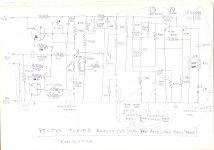Hi 
also I am interested to the germanium amplifiers.
I have these bjt recycled from an old car-radio Voxon.
unfortunately I have not the original schematics
also I am interested to the germanium amplifiers.
I have these bjt recycled from an old car-radio Voxon.
unfortunately I have not the original schematics

An externally hosted image should be here but it was not working when we last tested it.
NIC1138 said:
I've been looking for a mosfet overdrive too... Now this is one I believe will produce the so much advertized "smooth distortion"!!... Do you happen to have a schematic for this?
Here is one that uses Mosfets in the feebback loop of an opamp for Overdrive....
http://www.diystompboxes.com/pedals/schems/MOSFERATU.gif
this one uses a Mosfet to Overdrive some J-Fets:
http://diystompboxes.com/pedals/schems/xfet.pdf
there are others
other schematics can be found here :
http://www.christianmusicweb.com/schematics/
and
http://www.muzique.com/schem/index.html
bye
http://www.christianmusicweb.com/schematics/
and
http://www.muzique.com/schem/index.html
bye
so-called "smooth" distortion is actually asymmetrical distortion with a lot of even harmonics. it's more musical because all of the even harmonics, even the high-order ones (6th, 8th, 10th, etc...) are all "musically" related to the fundamental, but some of the high order odd harmonics (especially the 7th, and 11th) are dissonant, and while harmonically related are not musically related. if you have ltspice, you can simulate various clipping methods, look at their spectrum with the FFT function, and you can even use a .wav file as a signal source, as well as saving the circuit output as a wav file so you can listen to it. just this weekend i was using the wave functions to check the sound of a fuzz/wah combo i'm designing.
unclejed613 said:it's more musical because all of the even harmonics, even the high-order ones (6th, 8th, 10th, etc...) are all "musically" related to the fundamental, but some of the high order odd harmonics (especially the 7th, and 11th) are dissonant, and while harmonically related are not musically related.
Hmmm I've heard quite a lot of that, but it's another concept I wanted to question in my study!
Afterall, what happens if you have the 2nd, 6th, the 10th and the 14th harmonic, all of them even, and filter out the fundamental??...
I have this theory that's all about beatings... Even the pure tone of a string have some kind of "dissonance", that creates beatings. The right signal and the right overdrive distortion can enhance the perception of them... Amplitude moulation becomes harmonics of high frequency being switched on and off!
I'm a fan of the the 3rd harmonic, which can be produced by playing the so-called "fifth" note in a chord. People use it often, in the popular "power chord", and usualy with overdrive!... We must undestand exactly what is going on there, to create the ultimate overdrive distortion, and then the last rock and roll record of the history!
Germanium transistors are the best !
Actually I use power germanium transistor in my new projects and the sound is very superior, very close to tube amplifiers.
The old is the best !
Actually I use power germanium transistor in my new projects and the sound is very superior, very close to tube amplifiers.
The old is the best !
Hi
also I am interested to the germanium amplifiers.
I have these bjt recycled from an old car-radio Voxon.
unfortunately I have not the original schematics
An externally hosted image should be here but it was not working when we last tested it.
The last time I used germanium transistors I built a very powerful stereo amp using RCA 2n2147 type of output transistors. If I remember correctly I got 20 watts per channel using 6 output transistors per channel. I also use 1n34 diodes for bias. I don,t remember who I gave it to..About 2 years after building this amp Eico Corp. came out with a kit using the same devices, which produced about 15 watts per channel which sounded pretty good considering it was transfromer coupled. Good luck with your search. Evette
Germanium
The amp I use every day is a 1970 Rank Arena A220 made around 1970. It has a transformer driving 2 x 2n2148 output transistors. this was originally meant to drive 4 ohm closed speakers at 10 watts /channel. I am using bass reflex 6 ohm bookshelf Aiwa units and the amp drives these very easily producing a valve-like sound.
The driver transistors are ac187 and the transformer is biflar wound.
Incidentally the controls on the amp are Alps and still work perfectly.
The amp I use every day is a 1970 Rank Arena A220 made around 1970. It has a transformer driving 2 x 2n2148 output transistors. this was originally meant to drive 4 ohm closed speakers at 10 watts /channel. I am using bass reflex 6 ohm bookshelf Aiwa units and the amp drives these very easily producing a valve-like sound.
The driver transistors are ac187 and the transformer is biflar wound.
Incidentally the controls on the amp are Alps and still work perfectly.
I'm designing a Germanium transistor amp that should put out 35 watts a channel at 8 ohms. Transformer driven outputs. So far I have tried a lot of power transistors and the only one that seems to work good enough is 2N4242. The rest start their roll-off at 8 to 10 KHz. Transformer is hexfilar. More later.
Here is a schematic of a HMV STEREO 666 Record Player of 1976. It has 6W per channel output (I think!). the output transistors are TP4 and TP6, two Germanium identical pair. It has a BC187 in its buffer stage, however in the schematic it is written as BC188 (actually the number of the transistor was unreadable when I drawn the schematic, it might be AC187 or AC188, the Ge ones)............
Attachments
- Status
- This old topic is closed. If you want to reopen this topic, contact a moderator using the "Report Post" button.
- Home
- Amplifiers
- Solid State
- Germanium output stage
